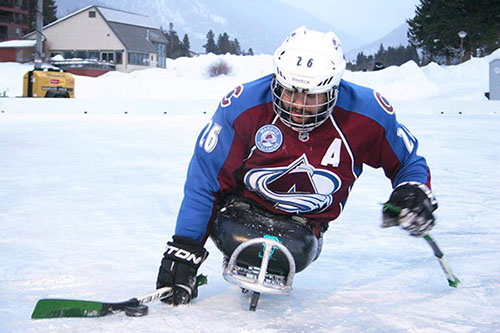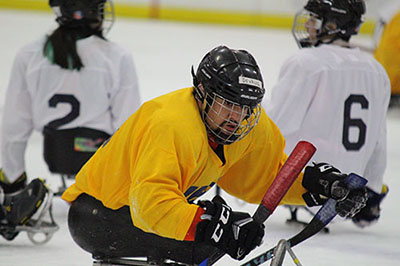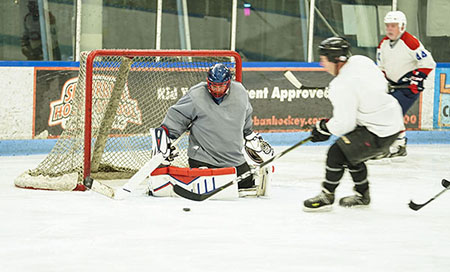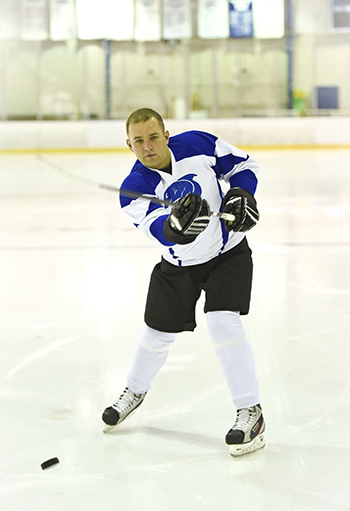Hockey Helps Warriors Exceed Goals – With Assist from Wounded Warrior Project

Army veteran Jerry DeVaul grew up in Colorado, but his involvement in hockey took place more on the asphalt than the ice. His affection for ice hockey really kicked into high gear in 1996, when the NHL’s Colorado Avalanche came to town. After that, Jerry became an ardent Avalanche fan.
Serving in the military allowed Jerry to be part of a team – and gave him a sense of purpose. Like many other veterans, it was getting out of the military that Jerry struggled with. Then he lost both his legs in a tragic accident while working in a coal mine, sending his post-traumatic stress disorder (PTSD) and depression into overdrive. Participating in adaptive sports helped him combat those feelings and regain his sense of purpose.
“I realized that sports translate into the real world like no one’s business,” Jerry said. “[In the military], you have to be able to communicate. You have to be able to work things out with your peers. And that's the same thing you're doing on the ice.”
Now Jerry has become part of the Avalanche family. He plays on the NHL franchise’s sled hockey team, which is also part of USA Hockey.
Warrior David Denhardt, a U.S. Marine and Army National Guard veteran, has been a hockey fan for as long as he can remember. After all, he’s from Detroit, Michigan, where the Red Wings reign supreme. He started playing hockey almost as soon as he could walk.
When he was injured during a rocket blast while serving in Afghanistan, he thought any opportunity to continue playing the sport he loved ended.
“I never thought I could play again.” David said. “When I got back to Michigan, we had someone putting together a veteran hockey program. I tried out sled hockey but had a lot of trouble with my left side, so, I decided I could play goalie.”
After serving in the U.S. Marines Corps, Mike Heller returned home to Pennsylvania. He and his family lived near an ice rink, and he thought it might be nice to take his daughter ice skating, something Mike had never done. That trip to the rink would develop into a lifelong passion for playing ice hockey.
Healing Through Hockey
Jerry’s path to playing for the Avalanche’s sled hockey team wasn’t an easy one. After leaving the service, Jerry took a job working in a coal mine. One day, while Jerry was drilling in the mine, a co-worker of his hit him from behind with a mining scoop, amputating both of his legs. Jerry waited nearly two hours for help to arrive, praying and trying to keep his heartrate under control so he didn’t bleed out. There were times when he wasn’t sure he’d make it. When help finally arrived, they weren’t sure he'd make it, either.

For six years, after his accident Jerry was trying to numb the pain with medication and alcohol. But it was only a short-term solution and one that wasn’t making him feel better. Jerry began adding more physical activities to his regiment, then one day he saw a sled hockey bus.
"Biking is what started to get me going, but then once I played sled hockey, that's when I really realized what I needed to do and why I needed to better myself,” Jerry said.
Jerry was selected to go to the National Development Team Camp and competed for a coveted spot. He worked on his skills diligently. He participated in CrossFit training through the Physical Health & Wellness Program at Wounded Warrior Project® (WWP), which helped him improve his speed on the ice and his strength. Jerry now plays on a hugely competitive team with players who were all part of the winning World Cup championship team at the Paralympics. He also runs the Colorado Sled Hockey league.
“We try to break barriers by getting people on the ice and showing them that there's an outlet for them,” Jerry said. “It gives veterans an opportunity to go out and perform in these adaptive sports and learn about other adaptive sports.”
A rocket attack in Afghanistan altered the direction of David’s life. He spent two years after that attack at the Warrior Transition Unit recovering from injuries and going through medical boards. He was diagnosed with PTSD, traumatic brain injury (TBI) and nerve damage. He also started experiencing seizures. The most difficult thing during his transition from military service was going home and doing nothing.

“It’s hard for me to make that transition to being the one taking care of everybody and now all of a sudden, I’m the one who needs the help,” David said. “I can’t do a lot of the things I used to do, but want to do, and trying to find a way to continue to do it has been a challenge.”
He was able to fill that void when he discovered Warrior Hockey and WWP programs.
“That’s what makes it so great, you can get out and still have that camaraderie by doing things like a hockey program or being involved in other veterans service organizations and groups,” David said.
It was a clear, sunny day when the Humvee that Mike was riding in was hit in a mortar attack in Iraq. Mike remembers being thrown from the vehicle and then things went dark. He woke up in a ravine on the side of the dirt road. It took several hours for Mike and other members of his platoon to get to the hospital. Mike lost his close friend and other brothers in arms in that attack. After leaving the service, he tried to deal with the mental fallout on his own but realized that wasn’t working. He attended a WWP event and recognized how important having social support is for a veteran’s mental well-being.
Playing Warrior Hockey was just a continuation of the veteran connection, although Mike kind of stumbled into the sport. He lived near an ice rink, and decided to take his daughter ice skating, although he’d never been ice skating before. At the rink, he saw an adult skating class and signed up immediately. He was introduced to Warrior Hockey through the Pittsburgh Penguins Foundation. When he moved to Florida, he was able to find another Warrior Hockey team there.
“If I could skate every day, I'd be a happy person,” Mike said. “There are a lot of benefits of being physically active and being on ice with friends. I've built really amazing relationships and friendships out of it.”
A Sport for All Ages and Abilities
"Hockey is the most adaptive sport there is,” David said. “There are so many different ways to do it.”
There are many different types of hockey. In sled hockey, like Jerry plays, players move around on a sled that sits on top of two hockey skate blades. There is also blind hockey, where the main difference from ice hockey is that all players are legally blind.
“Blind hockey is one of the coolest sports out there,” Jerry said. “They get this big metal can and put ball bearings in it. It's called a ‘rattle can.’ They're skating up and down the ice at full speeds. They're all stand-up skaters and they're using their sticks to communicate. It's unreal watching the goalie slide left and right because he hears the jingle of the can. The concentration is unreal, and yet they're just out there playing hockey, getting to do what they love and enjoy that camaraderie.”

David and Mike are both involved in Warrior Hockey, which is seeing tremendous growth. USA Hockey’s Warrior Hockey is open to U.S. veterans and service members. Players have varying degrees of skill, from those who have played hockey since childhood to those who are lacing up their skates for the first time.
“It's a very welcoming environment,” Mike said. “Everybody's there to learn and build relationships. Everybody's very supportive and making sure that it's a positive influence and making a positive impact on their lives.”
Less than a decade ago, there were four Warrior Hockey teams, mostly concentrated in the North. Now, there are over 30 teams spread across the U.S. Veterans involved in the sport have been spreading the word.
“People say, ‘How can you play hockey? We watch you walk and all of a sudden, you get on ice and you’re like a young kid,’” David said. “If you have something that you love and something you really care about and want to do, you’ll do it.”
There’s also no shortage of support for veterans who think hockey might be something they want to engage in. There are multiple leagues of different skill levels, and assistance for getting any gear needed, Mike said.
“I think the biggest message is that hockey is really for everybody,” Mike said. “It's a great sport to learn how to play and the people involved are always positive and trying to help you get better, making sure it's a great experience for everybody.”
Part of a Team … Again
Camaraderie is a common theme in team sports – and in the military. Both require strong communication and teamwork to meet a common goal. There are also the undeniable bonds that form among U.S. service members who play for the same team to defend the country.
“[In the military], we have to communicate, and it's the same thing on the ice,” Jerry said. “As a team, you're trying to work on a championship, you're working on bettering yourselves as individuals, on and off the ice. That's one of the best things about the sport.”
While the health benefits of physical activity are well known, the mental health advantages for veterans who maintain friendships with fellow veterans is also a big factor.
“You build close friendships, you have your battle buddies, you have a group of individuals that, if you need something or is something's happening, you can pick up the phone. Having those conversations with other veterans who have lived through similar situations is always a huge mental benefit.”
For many veterans, overcoming obstacles in second nature, but it’s also something veterans don’t have to do alone. They always have a team.
“No matter what you go through and what challenges, and difficulties, and whatever comes your way, you can find a way around it,” David said. “You’ll have the support of so many behind you. WWP helped me learn how to do adaptive-style things and now playing hockey is a big part of my life.”
WWP helps veterans connect through mental health programs, peer support groups, alumni events and physical health and wellness, including adaptive sports. Find out more here.
Contact: — Paris Moulden, Public Relations, pmoulden@woundedwarriorproject.org, 904.570.7910
About Wounded Warrior Project
Since 2003, Wounded Warrior Project® (WWP) has been meeting the growing needs of warriors, their families, and caregivers — helping them achieve their highest ambition. Learn more.